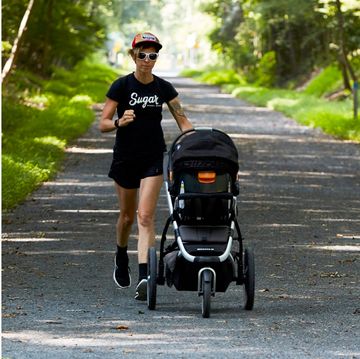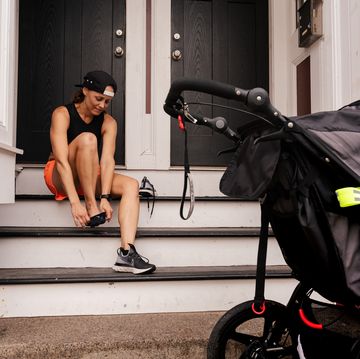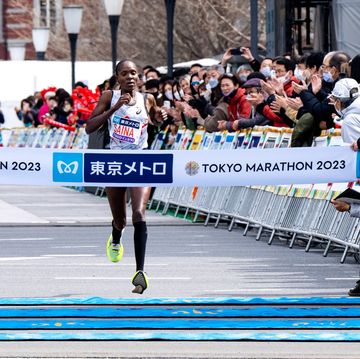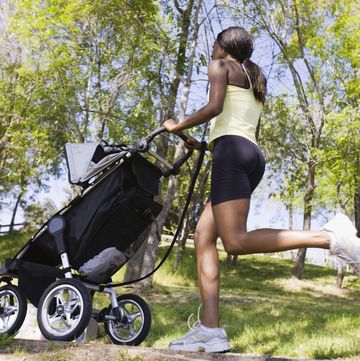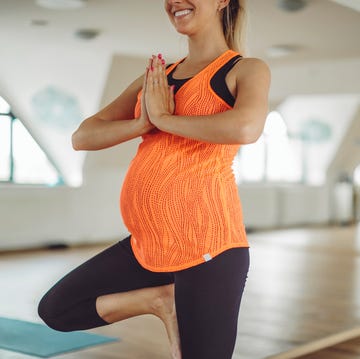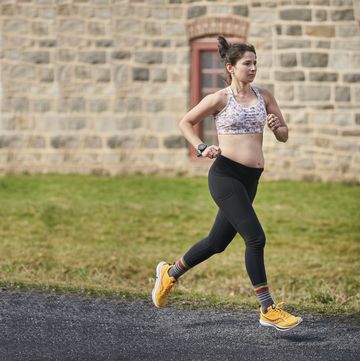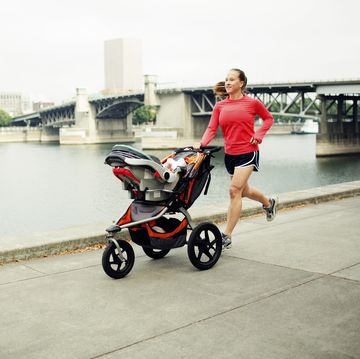When 39-year-old Jessica Sleight first returned to running post-partum, her expectations weren’t high. She had to recover from a C-section, she was sleep deprived, and she had less time to train than prior to giving birth. But eight months after her daughter Aleda entered the world in 2014, Sleight, of Spokane, Washington, posted a speedy 3:30 marathon. One month later, she tied her half marathon PR of 1:34 on a hilly course.
“I was mostly surprised by how easy it felt to run a time comparable to what I had run prior to baby,” she said of her marathon. “I recovered easily, and so figured I could run the half marathon a month later. I was undertrained, but it felt much easier than expected.”
Like some women, Sleight returned to pre-baby form surprisingly fast. From age-groupers to elites like Alysia Montano and Paula Radcliffe, some new running mamas are exhibiting a remarkable ability to bounce back. The anecdotal evidence is there, but what about the science?
A Part of Hearst Digital Media
“If a woman has a normal pregnancy and delivery with no issues, then she can have some residual effects—in the form of cardiovascular and hormonal changes—that might make running a bit easier,” said Michelle Mottolla, Ph.D., professor of kinesiology at the University of Western Ontario.
Another theory as to why some runners like Sleight have a good post-partum running experience is the “remodeled” heart. “During pregnancy, the heart actually changes to accommodate for a higher level of blood circulation,” Mottolla said. “While there is a large drop in plasma levels at birth, the heart is used to beating at a higher level in order to circulate the extra blood.”
The result? The heart likely doesn’t have to work as hard at any level of exertion following the process of giving birth. It’s something akin to the benefit some runners might experience from training at a low heart rate—eventually the heart adapts and helps move runners forward at less effort.
Many runners speculate that their increase in oxygen-rich red blood cells helps boost post-partum performance. This is true, but only for a short period. “That increase is there for about 120 days and then you return to more normal levels,” Mottolla said.
James Pivarnik, Ph.D., professor of kinesiology and epidemiology at Michigan State University said there is the possibility that the hormone relaxin, which helps prep a woman’s body for delivery, might play a role. “If relaxin makes a woman more flexible and that increases her stride length by even a small bit, she might benefit,” he said.
New moms might also experience a psychological boost from the delivery process. “There are women who might realize that if they can give birth, they can tough it out in a race, too,” Pivarnik said.
While Mottolla agrees that some women have increased sense of well-being after delivery, not everyone will experience that. "You can’t predict where hormone levels will be," she said.
All About 75 Hard
Some women will struggle with their running post-partum, even if they feel good at the onset. Issues like Advertisement - Continue Reading Below Give A Gift core strength can have a big impact on how quickly a runner can return to form.
This was the case for Sarah Canney, a 33-year-old mom in Rochester, New Hampshire. “I returned to running four weeks after an uncomplicated, vaginal delivery,” she said. “I was given the okay to run by my midwife, but my competitive nature got the better of me, and I started to intensify my running too soon. I suffered from a slight uterine prolapse and constant urine leakage.”
Mottolla emphasizes the importance of a gradual return for most women. “It’s important to take a structured approach to getting back in shape,” she said.
Laura Peifer, who is 34 and lives in West Orange, New Jersey, felt so good post-partum that she ran the 2015 Boston Marathon when her daughter was eight months old. “I had seen other women handle it and thought my body was up for it, but it was really intense,” she said. “The combination of poor sleep, breast feeding, and long runs was not appreciated by my body. I was lucky that I didn't get injured, but I did hit a wall a few weeks before Boston where I felt for the first time ever that I had overtrained." Rather than push things, Peifer took a step back and ran Boston at an easy pace, soaking in the experience.
There are still a lot of question marks surrounding this topic because no one has conducted any hard studies on the impact pregnancy has on running performance, for a couple of reasons. “I’d love to have some evidence, but it’s tough to get research funding for something like this,” Pivarnik said. “It’s not a public health concern.”
There’s also the fact that gathering data on the impact would be nearly impossible. “You could take measurements sometime after delivery, but unless you also had that information from right before someone became pregnant, it would be irrelevant,” Pivarnik said.
Ultimately, Mottolla said that how a runner performs after giving birth is dependent on a bevy of factors, many of which have nothing to do with the actual physical process. “Was the woman able to remain active throughout pregnancy? Does she have a good support system that allows her the freedom to train after delivery? Is she suffering from post-partum depression? All of these things can play a role,” Mottalla said.


